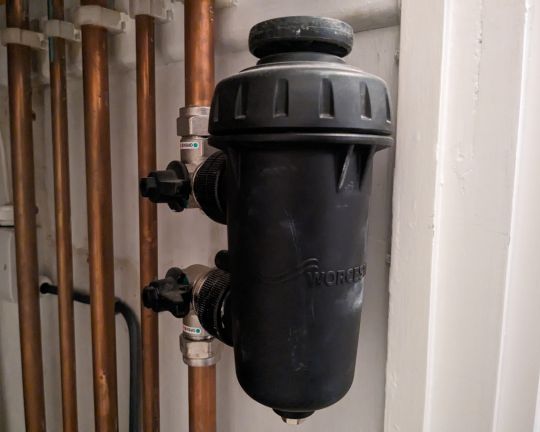Your boiler filter (or central heating filter) is an important component that keeps any sludge and other unwanted debris from entering your boiler.
In this guide we’ll go through the steps you can take to clean your boiler filter and make sure that it works to its full potential.
What is a boiler filter?
As we touched on in our intro, the job of the boiler filter is to stop all the unwanted bits that float around in your pipes from entering your boiler. This can include anything from sludge and debris, to rust that can collect in your pipes as they corrode.
They can operate in different ways. Some will use a strong magnet to help attract all of the waterborne particles, while others have a centrifugal (or whirlpool) action that helps separate the dirt and particles from the water.
Whichever type of filter you have, we recommend that you have it checked when you have your boiler serviced. The engineer will ensure that the filter is clear and that your heating is working efficiently.
How to clean a magnetic filter on a boiler
The cleaning of the filter on a boiler is usually done by an engineer as part of a boiler service. However, if you’re feeling confident in taking this on as a DIY job, depending on which filter you have, you can follow the steps below to get this cleaned properly.
14 steps to cleaning a magnetic style filter
Before you try to reset your boiler check the following:
- Turn off your heating system and boiler. Make sure you leave it to cool down before you start any work.
- Protect the area with a suitable dust sheet.This can be an extremely dirty job so make sure you’re wearing gloves and suitable clothing too.
- Locate the isolation valves for your filter and close them. Be careful as there are several isolation valves near the boiler. You only need to close the valves that lead to and from the filter.
- Place a bucket underneath the filter to catch any excess water.
- Using the appropriate tool gently loosen the top of the filter and allow any pressure and excess water to escape. Different filters may require different types of tools to loosen the top of the filter.
- Unscrew the filter completely, remove it and place it in the bucket
- Once over a drain, remove the magnet core and clean the black mixture, known as magnetite from the filter’s body.
- Wash the core with plenty of clean water.
- Replace the magnet into the core.
- Check that the washer is in place and not damaged, then replace the top of the filter back in place and tighten it.
- Open the isolation valves to the filter and release any air through the air vent on the top of the filter.
- Check for water leaks.
- If you have a sealed heating system, top the water pressure back up to the normal pressure.
- Turn the heating system and boiler back on.
9 steps to cleaning a dirt separator
- Turn off your heating system and boiler. Make sure you leave it to cool down before you start any work.
- Protect the work area with a suitable dust sheet. This can be an extremely dirty job so make sure you’re wearing gloves and suitable clothing too.
- Place a bucket underneath the filter/separator to catch any excess water.
- Gently open the service valve on the base of the filter/separator and allow the dirty water and debris to flow into the bucket.
- At first the water will be black, allow the water to run until the water looks clear.
- Close the service valve on the bottom of the separator.
- If you have a sealed heating system, top the water pressure back up to the normal pressure.
- Turn the heating system and boiler back on.
- Check the service valve for any water leaks.
How often should you be cleaning a magnetic filter on a boiler?
The professional advice on cleaning your boiler filter is once a year. This will help prolong the life of your boiler and stop any debris from causing a problem, such as a boiler breakdown, or worse still, a full boiler replacement.
Do I need a magnetic filter for my boiler?
Magnetic filters aren’t essential, but as we’ve mentioned, if you want to help your boiler last a bit longer and lower the costs of your heating bills each month, then it’s recommended that you have one.
Without one the build up of rust and debris is more likely, which will put the efficiency of your boiler at risk.
Keep your boiler running efficiently all year round with HomeServe
If cleaning your boiler filter feels like a step too far, then one of our Home Experts can take a look over your boiler for you when you book a gas boiler service.
You can do this, and take a look at our boiler cover options by visiting the boiler cover page on our website.
